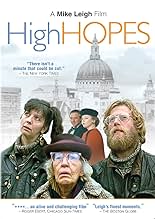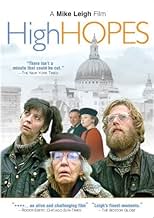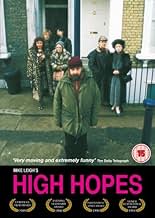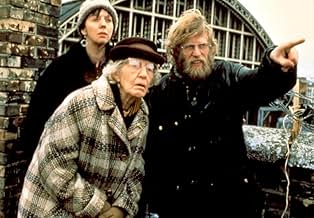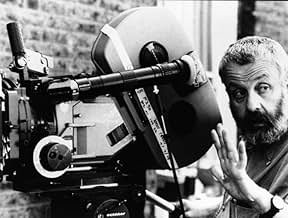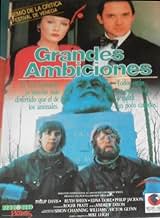VALUTAZIONE IMDb
7,4/10
6120
LA TUA VALUTAZIONE
Aggiungi una trama nella tua linguaThe life of a working class couple living in London and their complicated relationships with other members of the family.The life of a working class couple living in London and their complicated relationships with other members of the family.The life of a working class couple living in London and their complicated relationships with other members of the family.
- Regia
- Sceneggiatura
- Star
- Premi
- 6 vittorie e 6 candidature totali
Phil Davis
- Cyril
- (as Philip Davis)
Aidan Harrington
- Man in Street
- (non citato nei titoli originali)
Recensioni in evidenza
Surprisingly, this is the first Mike Leigh film I have seen. and I am glad to finally be exploring his filmography since he has intrigued me for quite some time, and I am happy to say with full enthusiasm that my first Leigh movie watching experience was wonderful.
"High Hopes" is a slice of life type film in which there is little plot, but rather a series of events that serve almost as a two hour long snapshot taken at a very specific time in the main characters' lives. While there are many interconnected characters displayed, each with their own mini story arc that can range from light comedy to dark tragedy to somewhere in between, at the center of the film is a likable young couple. A political undercurrent runs throughout the final half hour of the film dealing with the state of England under Margaret Thatcher and the beliefs of a socialist and Marxist, which is all quite interesting even if it makes the film somewhat outdated (but, with me, that isn't much of a problem); however, the film, in the end, is no so much about politics and ideology, but more so about the human spirit and its many triumphs and failures, life and it's many ups and downs. I fell in love with some of the characters in this film, and always felt deep care and concern for them. One shot in particular will always remain in my memory; it is the haunting image of an elderly women on her seventieth birthday as her family explodes (not literally) into chaos behind her. We can only see the elderly women, and we can only hear her screaming, bickering family members under the melancholic sounds of the film's often bleak score. This fragile lady is left to do no less than stare into nothingness, a fragile victim of the world's evils. But...this film is not a hopeless tragedy; rather, it is a hopeful comedy in the end, for, in the end, positivity seems to conquer the tears and tragedies that plagued the film in earlier moments (although not EVERY character seems to receive a "happy ending").
This film is a(n often darkly) humorous look into the lives of some very realistic and unique individuals as they struggle and smile through life. It is a film about love, compassion, strength, weakness, loneliness, politics, society, intimacies, and more. A beautiful feat of comic and dramatic filmmaking that sadly remains overlooked and obscure to this very day; fortunately, Mike Leigh was still rewarded in later years with a reasonably successful and highly praised career made up of many movies critics claim to be masterpieces, many movies that I now cannot wait to get my hands on!
"High Hopes" is a slice of life type film in which there is little plot, but rather a series of events that serve almost as a two hour long snapshot taken at a very specific time in the main characters' lives. While there are many interconnected characters displayed, each with their own mini story arc that can range from light comedy to dark tragedy to somewhere in between, at the center of the film is a likable young couple. A political undercurrent runs throughout the final half hour of the film dealing with the state of England under Margaret Thatcher and the beliefs of a socialist and Marxist, which is all quite interesting even if it makes the film somewhat outdated (but, with me, that isn't much of a problem); however, the film, in the end, is no so much about politics and ideology, but more so about the human spirit and its many triumphs and failures, life and it's many ups and downs. I fell in love with some of the characters in this film, and always felt deep care and concern for them. One shot in particular will always remain in my memory; it is the haunting image of an elderly women on her seventieth birthday as her family explodes (not literally) into chaos behind her. We can only see the elderly women, and we can only hear her screaming, bickering family members under the melancholic sounds of the film's often bleak score. This fragile lady is left to do no less than stare into nothingness, a fragile victim of the world's evils. But...this film is not a hopeless tragedy; rather, it is a hopeful comedy in the end, for, in the end, positivity seems to conquer the tears and tragedies that plagued the film in earlier moments (although not EVERY character seems to receive a "happy ending").
This film is a(n often darkly) humorous look into the lives of some very realistic and unique individuals as they struggle and smile through life. It is a film about love, compassion, strength, weakness, loneliness, politics, society, intimacies, and more. A beautiful feat of comic and dramatic filmmaking that sadly remains overlooked and obscure to this very day; fortunately, Mike Leigh was still rewarded in later years with a reasonably successful and highly praised career made up of many movies critics claim to be masterpieces, many movies that I now cannot wait to get my hands on!
Released in 1988, this is Mike Leigh's (director of Vera Drake) sublime comedy which examines the social climate of 1980s London.
I really liked this film, it centres on one extended family living in London during the Thatcher years. Cyril is a Marxist, who does despite his strong values and views chooses not to act on them, giving the world up for a hopeless cause. His partner, Shirley, desperately wants a baby, despite Cyril's strong views that the world is already "over-populated". Living in the last council house on a now yuppie infested road is Cyril's mum. A member of the generation who has been forgotten, she is slowly losing her marbles, much to the distaste of her neighbours. And as for Cyril's sister, Valerie, who lives in the social climbing climate of the middle class, she has seemingly to forgotten her roots and family ties, no doubt due to her excessive drinking of cheap champagne and her leeching husband.
This film is a brilliant gem of 1980s British cinema, despite its clear socialist values (it's cartoonish portrayal of the rich and yuppie somewhat softens the blow of its left wing message), it brings up so many interesting questions in an intelligent manner, portraying all its characters from a variety of angles and political stances, its hard not to like Cyril, but when he criticises a young 'active' Marxist follower for planning to open a market stall, he is shown to be hypocritical.
Leigh' doesn't just direct, but also write, and the script is water tight. It is extremely witty, just full of emotion and very down to earth.
This film is a very good snap shot of life in a variety of social situations and views in the churning world of the 1980s as the capitalistic London really began to boom. It is a flick that will not doubt have you smiling from cheek to cheek, yet also leave you feeling emotionally vulnerable and self-questioning.
I really liked this film, it centres on one extended family living in London during the Thatcher years. Cyril is a Marxist, who does despite his strong values and views chooses not to act on them, giving the world up for a hopeless cause. His partner, Shirley, desperately wants a baby, despite Cyril's strong views that the world is already "over-populated". Living in the last council house on a now yuppie infested road is Cyril's mum. A member of the generation who has been forgotten, she is slowly losing her marbles, much to the distaste of her neighbours. And as for Cyril's sister, Valerie, who lives in the social climbing climate of the middle class, she has seemingly to forgotten her roots and family ties, no doubt due to her excessive drinking of cheap champagne and her leeching husband.
This film is a brilliant gem of 1980s British cinema, despite its clear socialist values (it's cartoonish portrayal of the rich and yuppie somewhat softens the blow of its left wing message), it brings up so many interesting questions in an intelligent manner, portraying all its characters from a variety of angles and political stances, its hard not to like Cyril, but when he criticises a young 'active' Marxist follower for planning to open a market stall, he is shown to be hypocritical.
Leigh' doesn't just direct, but also write, and the script is water tight. It is extremely witty, just full of emotion and very down to earth.
This film is a very good snap shot of life in a variety of social situations and views in the churning world of the 1980s as the capitalistic London really began to boom. It is a flick that will not doubt have you smiling from cheek to cheek, yet also leave you feeling emotionally vulnerable and self-questioning.
The life and times of an extended family in 1980's London.
Director Mike Leigh is probably the closest the UK has to Woody Allen: and like Allen his films go from absolute classics to barely watchable. Here he is about as good as he ever will be - indeed there are scenes from this movie that are, in there own way, as profound and original as anything that has been put down on film.
Who else would let the camera linger on the face of an old woman just at the point of losing her sanity? Or dare to present a couple going nowhere as the centrepiece of a feature film? Or even present "success stories" (a yuppie couple) as rank and selfish? Here lower-middle-and-upper crusts are clowns, it is only a matter of levels and angles.
Indeed, Leigh never gives us anything to cling to. Nor does he want to present hope that things will change for the better. Take the central couple Shirley and Cyril (Philip Davies and Ruth Sheen). Why are they living like squatters in their own tiny flat? Why can they not buy a proper bed (they sleep on the floor) or look for somewhere better - after all they both work? Apart from the question of a child (she wants - he doesn't) they both seem happy to live in squalor. In Shirley we at least have someone who cares for other people.
The old lady - through which the story is told - is on her last legs as regards living an independent life. The house she lives in has become neglected and the area she lives in no longer contain her type of people. Her neurotic daughter is so wrapped up in her own suburban life that she does seem to realise her mother is at the point of collapse. The scene where she holds a birthday party for her aged mother is agony - not for her confused mother - but for us the viewer.
Some of the performances are a little of the top (Leigh's films let actors improvise) and I could have lived without so much of the melancholy music track that rubs everything in. But this is the only film since One Flew Over The Cuckoo's Nest that lets humour and tragedy sit side by side without blinking.
Director Leigh gets under your skin and takes you places we haven't been on film before - but I am not sure they are places I would want to go on a regular basis. He is a one-off, but I am secretly glad about that.
Director Mike Leigh is probably the closest the UK has to Woody Allen: and like Allen his films go from absolute classics to barely watchable. Here he is about as good as he ever will be - indeed there are scenes from this movie that are, in there own way, as profound and original as anything that has been put down on film.
Who else would let the camera linger on the face of an old woman just at the point of losing her sanity? Or dare to present a couple going nowhere as the centrepiece of a feature film? Or even present "success stories" (a yuppie couple) as rank and selfish? Here lower-middle-and-upper crusts are clowns, it is only a matter of levels and angles.
Indeed, Leigh never gives us anything to cling to. Nor does he want to present hope that things will change for the better. Take the central couple Shirley and Cyril (Philip Davies and Ruth Sheen). Why are they living like squatters in their own tiny flat? Why can they not buy a proper bed (they sleep on the floor) or look for somewhere better - after all they both work? Apart from the question of a child (she wants - he doesn't) they both seem happy to live in squalor. In Shirley we at least have someone who cares for other people.
The old lady - through which the story is told - is on her last legs as regards living an independent life. The house she lives in has become neglected and the area she lives in no longer contain her type of people. Her neurotic daughter is so wrapped up in her own suburban life that she does seem to realise her mother is at the point of collapse. The scene where she holds a birthday party for her aged mother is agony - not for her confused mother - but for us the viewer.
Some of the performances are a little of the top (Leigh's films let actors improvise) and I could have lived without so much of the melancholy music track that rubs everything in. But this is the only film since One Flew Over The Cuckoo's Nest that lets humour and tragedy sit side by side without blinking.
Director Leigh gets under your skin and takes you places we haven't been on film before - but I am not sure they are places I would want to go on a regular basis. He is a one-off, but I am secretly glad about that.
Of course the marketing people hype every movie like it's a cross between "Titanic" and "Wedding Crashers" but there is such a thing as a small lovely film and "High Hopes" is it. It's a comedy but nobody passes gas or accidentally drinks urine, so it's a cut above any comedy produced in the U.S. during the last thirty years. It's just about people, working class people in London trying to get by. But its got a good heart and the smiles it provides will stick with you longer than the brain-dead belly laughs strained over in Hollywood comedies. It just feels like real life. The actors don't seem to be acting. And you end up pretty hopeful regarding the human condition.
Mike Leigh's bittersweet social satire dissected with devastating accuracy (and a sometimes heartbreaking sense of humor) the widening gap between the haves and have-nots in Margaret Thatcher's England, moving from transparent criticism to crass parody to, finally, a touching plea on behalf of the elderly. It's a gray little film, giddy and depressing all at once, although often as funny (and just as striking) as hearing fingernails scraped down a blackboard. Leigh's cross-section of British society rings true even at its most exaggerated, and his ear for language, whether mumbled Cockney slang or nasal upper-class snobbery, is pitch perfect.
The film is essentially a showcase for some wonderfully defined characters: marginalized counterculture Marxists Cyril and Shirley; Cyril's ultra-neurotic middle-class sister and her vulgar salesman husband; an infirm old mum; a pair of callous upscale neighbors; and an odd, occasional houseguest named Wayne. The plotting is furtive: nothing much happens over the course of the film, giving the cast plenty of room to stretch out in their roles. The characters and story lines were created by the entire cast through extensive pre-production rehearsals, but the finished film is remarkably cohesive, with acting so natural it could easily be mistaken for improvisation if it weren't so well written. The result is a film of rare and genuine emotion: it's either the gloomiest comedy ever made or a tragedy with no shortage of laughs.
The film is essentially a showcase for some wonderfully defined characters: marginalized counterculture Marxists Cyril and Shirley; Cyril's ultra-neurotic middle-class sister and her vulgar salesman husband; an infirm old mum; a pair of callous upscale neighbors; and an odd, occasional houseguest named Wayne. The plotting is furtive: nothing much happens over the course of the film, giving the cast plenty of room to stretch out in their roles. The characters and story lines were created by the entire cast through extensive pre-production rehearsals, but the finished film is remarkably cohesive, with acting so natural it could easily be mistaken for improvisation if it weren't so well written. The result is a film of rare and genuine emotion: it's either the gloomiest comedy ever made or a tragedy with no shortage of laughs.
Lo sapevi?
- QuizBefore Belle speranze (1988), director Mike Leigh had made Bleak Moments (1971), released in 1971, and Meantime (1983), released in 1983. This gap in his filmography was attributable in part to his process for creating films: When he applied for financial backing, he did not yet have finished scripts, preferring to allow actors, once they were hired, to use improvisation sessions to create the dialogue. As a result, given the absence of a concrete script, many potential financial backers were reluctant to support Leigh's work. For "High Hopes," that spelled doom until the British TV station Channel 4 stepped in and partially funded it. The result is one of the most moving and engaging films of the 1980s and an early masterwork in Leigh's catalog.
- BlooperAfter they come back from the opera, Lætitia sings the aria "La ci darem" to Rupert, which she claims was from the opera they just saw. They proceed to talk about the characters Susanna and Cherubino. However, these characters are from The Marriage of Figaro whereas the aria "La ci darem" is from Don Giovanni.
- Citazioni
Rupert Boothe-Braine: Now... what made this country great was a place for everyone, and everyone in his place. And this is my place.
I più visti
Accedi per valutare e creare un elenco di titoli salvati per ottenere consigli personalizzati
- How long is High Hopes?Powered by Alexa
Dettagli
- Data di uscita
- Paese di origine
- Lingua
- Celebre anche come
- High Hopes
- Luoghi delle riprese
- Stanley Passage, King's Cross, Londra, Inghilterra, Regno Unito(apartment of Ruth Sheen and Philip Davis)
- Aziende produttrici
- Vedi altri crediti dell’azienda su IMDbPro
Botteghino
- Budget
- 1.800.000 £ (previsto)
- Lordo Stati Uniti e Canada
- 1.192.322 USD
- Fine settimana di apertura Stati Uniti e Canada
- 27.964 USD
- 26 feb 1989
- Lordo in tutto il mondo
- 1.192.322 USD
Contribuisci a questa pagina
Suggerisci una modifica o aggiungi i contenuti mancanti

Divario superiore
By what name was Belle speranze (1988) officially released in India in English?
Rispondi
